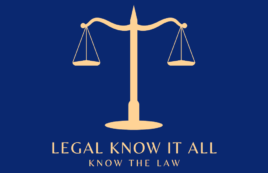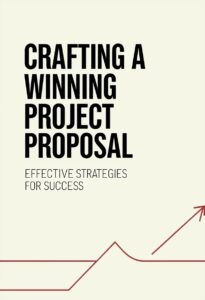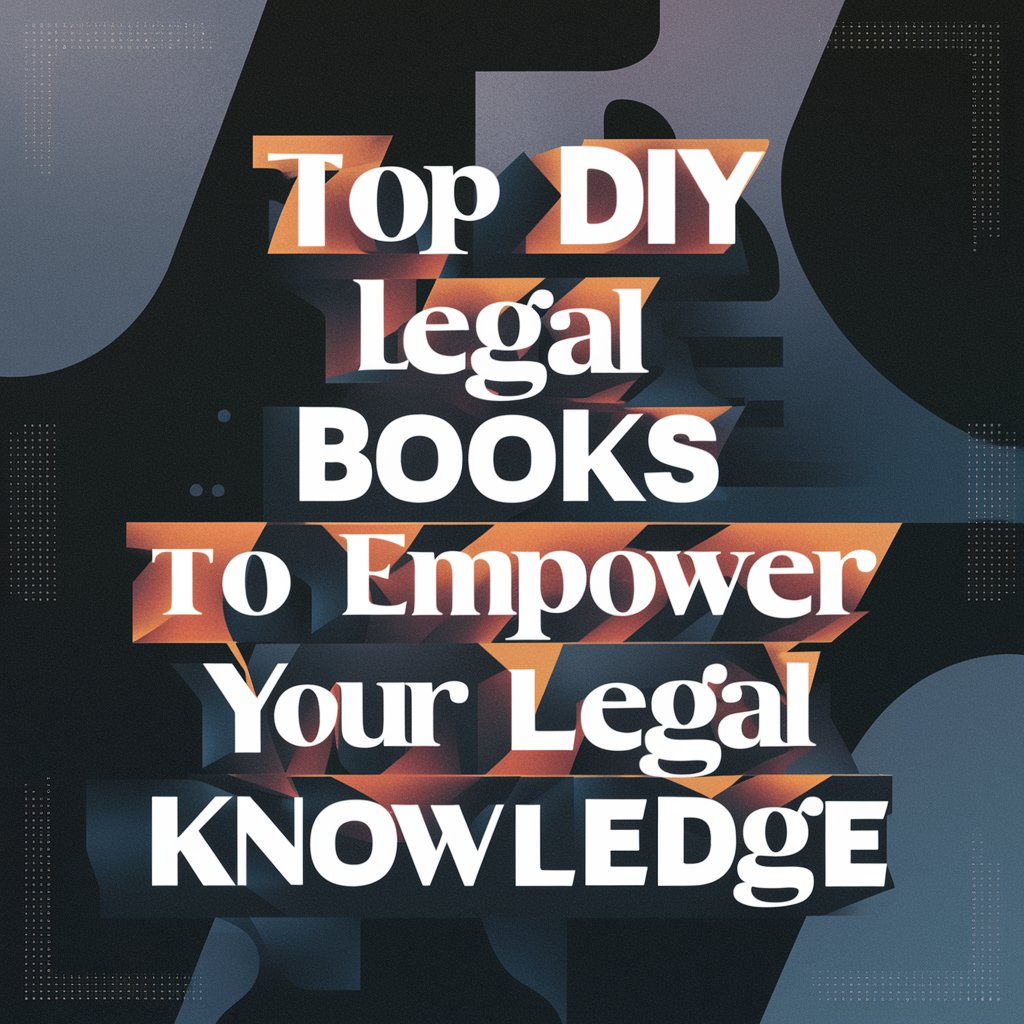
Why DIY Legal Books Are Essential for Everyone
In today’s world, legal issues can pop up unexpectedly, and having a basic understanding of the law is more important than ever. Whether it’s dealing with a minor traffic ticket, understanding your rights during a police stop, or preparing your estate, knowing the basics can save you a lot of time, stress, and money. That’s where DIY legal books come in—they’re a powerful tool for anyone who wants to take control of their legal affairs without always relying on an attorney.
DIY legal books are designed to make complex legal concepts accessible to everyone. They break down the jargon and provide clear, step-by-step instructions on how to handle various legal situations. These books empower you to address your legal needs independently, whether it’s drafting a will, understanding the intricacies of estate planning, or learning how to argue your case effectively.
By investing in a good DIY legal book, you’re not just saving on legal fees; you’re also gaining valuable knowledge that can protect you and your loved ones. Plus, these books are a great starting point for anyone interested in exploring the law more deeply. For example, if you’re ever stopped by the police, knowing your rights can make a significant difference in how the situation unfolds. To understand more about your rights during such encounters, check out our guide on what to do if you’re stopped by the police.
In this article, we’ll explore some of the best DIY legal books available, why they’re essential, and how they can help you navigate the legal landscape with confidence.
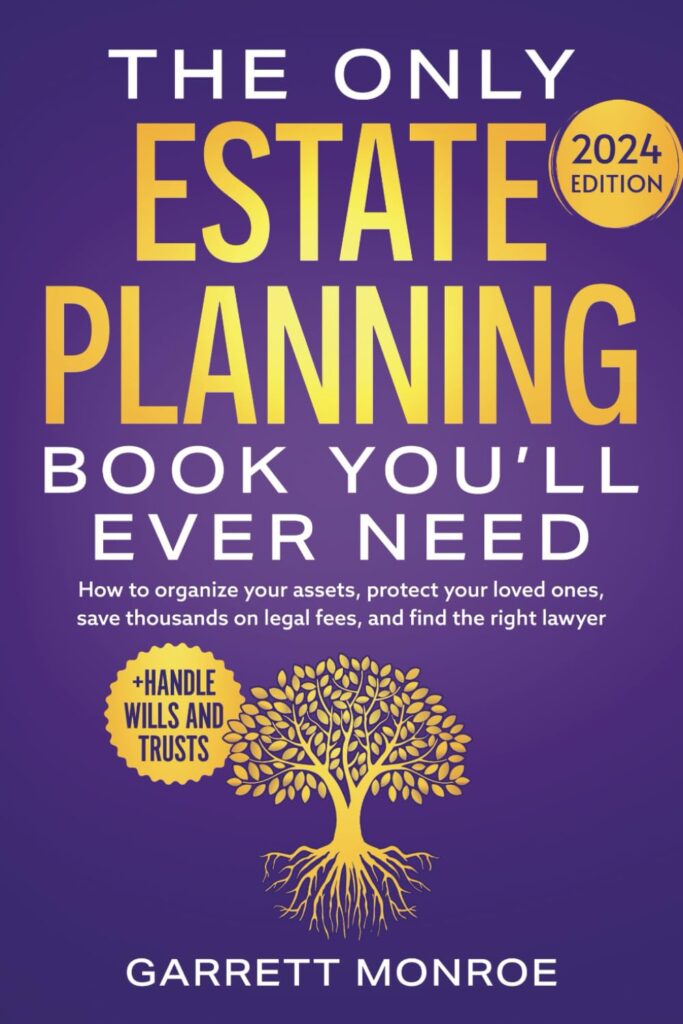
The Only Estate Planning Book You’ll Ever Need: Protecting Your Loved Ones
Estate planning is something many people put off, often until it’s too late. But the truth is, having a solid estate plan is one of the most important things you can do to protect your loved ones and ensure your assets are handled according to your wishes. That’s where The Only Estate Planning Book You’ll Ever Need comes in—this comprehensive guide simplifies the process and helps you take control of your financial future.
This DIY legal book breaks down the complexities of estate planning into easy-to-understand steps, making it accessible even if you have no legal background. It covers everything from organizing your assets and creating a will to setting up trusts and naming beneficiaries. The book also provides valuable insights on how to save thousands on legal fees, which can be especially helpful if you’re looking to handle much of the process on your own.
What makes The Only Estate Planning Book You’ll Ever Need stand out is its practical advice on protecting your loved ones. By guiding you through the process of creating a thorough estate plan, it helps ensure that your family won’t be left with the burden of sorting out your affairs during an already difficult time. Plus, with clear examples and straightforward language, it’s a resource that you’ll actually want to use.
But estate planning isn’t just about wills—it also includes other important documents like TOD (Transfer on Death) deeds, durable powers of attorney, and healthcare directives. For a deeper dive into these essential tools, you can explore more in our article on Beyond the Last Will: Exploring TOD Deeds, Durable Powers of Attorney, and Healthcare Directives.
If you’re ready to take charge of your estate planning, The Only Estate Planning Book You’ll Ever Need is a must-have addition to your legal library. It’s not just a book—it’s a step toward securing your family’s future.

The Tools of Argument: Mastering Legal Thinking and Arguing
When it comes to handling legal matters, whether you’re negotiating a contract, dealing with a dispute, or even just debating an issue with a friend, the ability to argue effectively is crucial. This is where The Tools of Argument: How the Best Lawyers Think, Argue, and Win can be a game-changer. This DIY legal book is designed to teach you the techniques that top lawyers use to build persuasive arguments, making it an invaluable resource for anyone looking to sharpen their reasoning skills.
The Tools of Argument offers practical insights into the art of legal argumentation. It breaks down complex strategies into understandable concepts, showing you how to think critically, frame your arguments logically, and present your case convincingly. Whether you’re preparing for a legal battle or simply want to improve your ability to argue your point of view, this book provides the tools you need to succeed.
One of the standout features of The Tools of Argument is its accessibility. The author demystifies legal reasoning, making it approachable even for those without a legal background. You’ll learn how to structure your arguments effectively, anticipate counterarguments, and use evidence to support your claims—all skills that are as useful in the courtroom as they are in everyday life.
If you’re considering representing yourself in a legal matter, this book is an essential read. And if you’re in the process of finding the right legal representation, you might also want to check out our guide on How to Choose the Best Attorney for Your Case. Combining the knowledge from The Tools of Argument with expert guidance on selecting an attorney can give you a significant advantage.
Whether you’re dealing with legal issues, engaging in debates, or just want to refine your argumentative skills, The Tools of Argument is a must-have for your legal toolkit.
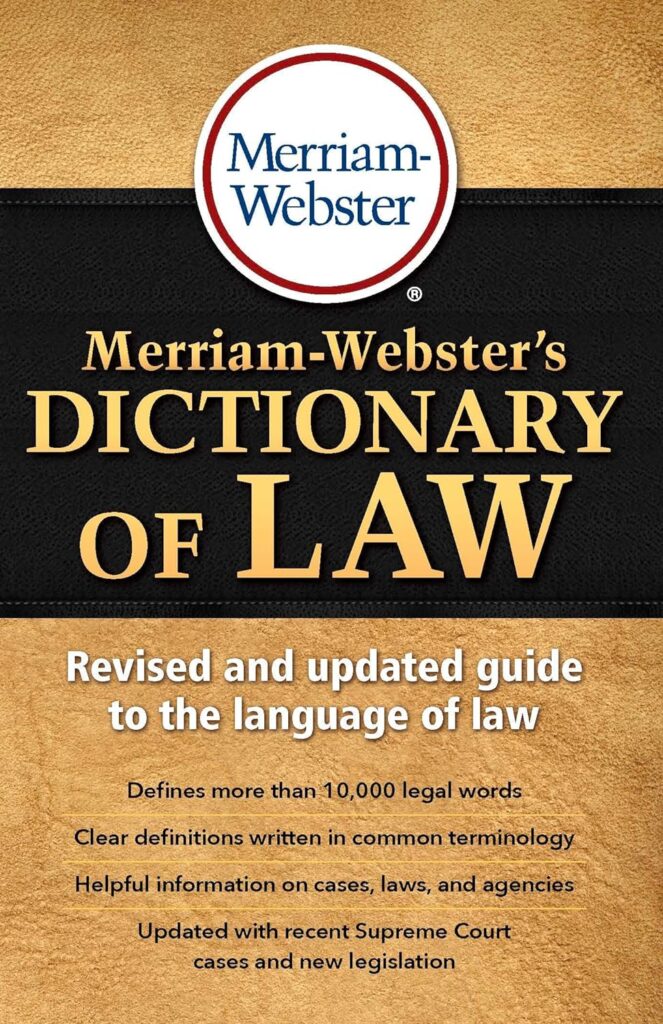
Understanding Legal Terms: The Importance of Legal Dictionaries
Navigating legal documents and understanding complex legal jargon can be challenging, especially if you don’t have a legal background. This is where a good legal dictionary becomes an essential tool. Having a reliable resource on hand can make all the difference when deciphering contracts, court rulings, or legal articles. Let’s explore why legal dictionaries are so important and how they can complement your DIY legal book collection.
Why You Need a Legal Dictionary
- Clarify Legal Jargon: Legal language is often filled with specialized terms that can be confusing. A legal dictionary provides clear, concise definitions, making it easier to understand complex documents and legal discussions.
- Improve Legal Writing and Communication: Whether you’re drafting a legal document or preparing an argument, understanding the precise meaning of legal terms is crucial. A dictionary ensures you’re using the correct terminology, which can improve the clarity and effectiveness of your communication.
- Boost Confidence in Legal Situations: When you’re familiar with legal terms, you’re more confident in legal settings, whether you’re negotiating a contract or reading through a legal notice. This confidence can also translate to better outcomes in your legal matters.
Top Legal Dictionaries to Consider
- Merriam-Webster’s Dictionary of Law:
- Overview: This dictionary is a trusted resource that offers up-to-date definitions of legal terms used in American law. It’s perfect for anyone who needs a comprehensive reference to clarify legal language.
- Key Features:
- Covers a wide range of legal terms, from basic to complex
- User-friendly format with clear definitions
- Ideal for students, professionals, and anyone dealing with legal documents
- Dictionary of Legal Terms: Definitions and Explanations for Non-Lawyers:
- Overview: Designed specifically for those without a legal background, this dictionary simplifies complex legal terms, making them accessible to everyone.
- Key Features:
- Plain-language explanations for over 3,000 legal terms
- Focuses on helping non-lawyers understand the law
- A must-have for anyone dealing with legal matters at home or in the workplace
How Legal Dictionaries Complement Your DIY Legal Books
- Enhancing Understanding: While DIY legal books are great for providing a broad understanding of legal concepts, a legal dictionary helps you dive deeper into specific terms that might not be fully explained in the books.
- Quick Reference: Keep a legal dictionary handy while reading your DIY legal books. When you encounter a term you’re unfamiliar with, you can quickly look it up, ensuring you fully grasp the content and context.
- Practical Application: Whether you’re drafting documents, preparing for a legal meeting, or simply trying to understand a legal situation, these dictionaries are invaluable tools. They ensure that you’re not just following legal procedures, but also understanding the language behind them.
For those who enjoy learning about the quirks of legal language, you might also find it fascinating to explore some of the oddities in global legal systems. Check out our article on the Top 9 Strangest Laws Globally for a fun and educational read.
By integrating Merriam-Webster’s Dictionary of Law and the Dictionary of Legal Terms into your legal resources, you’ll be well-equipped to tackle any legal document or discussion with confidence.
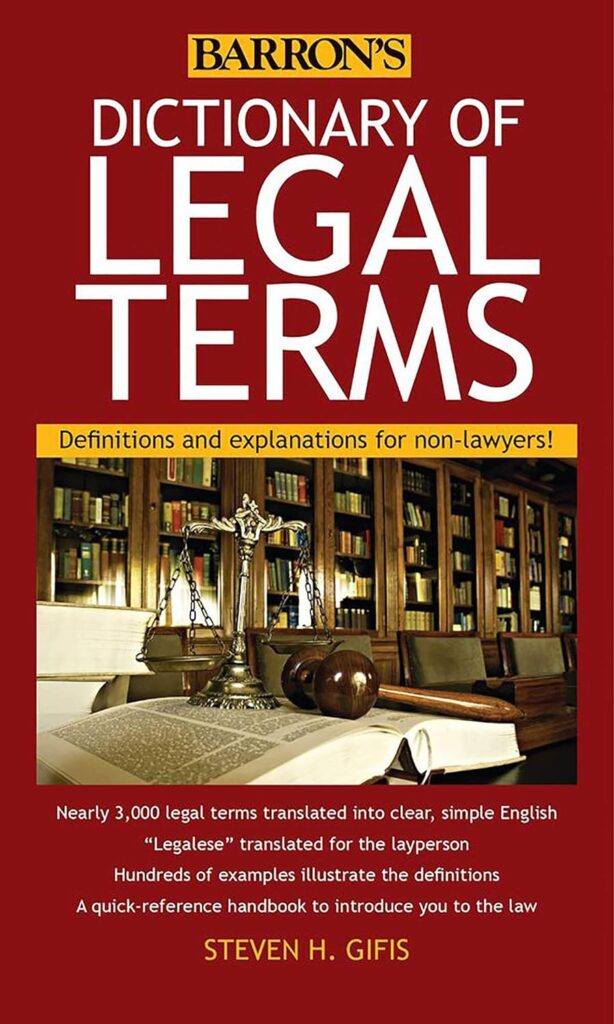
DIY Legal Books and Estate Planning: A Deeper Dive into Living Wills
Estate planning is more than just creating a will; it involves ensuring all aspects of your future healthcare and financial decisions are covered. One essential document in this process is a living will, which outlines your wishes regarding medical treatment if you become unable to communicate them yourself. DIY legal books can guide you through the process of drafting a living will, helping you make informed decisions that protect your interests.
Why a Living Will is Crucial
- Ensures Your Wishes Are Respected: A living will provides clear instructions about your healthcare preferences, such as life support, resuscitation, and other critical treatments. This document ensures that your medical care aligns with your values and desires, even if you’re unable to voice them.
- Reduces Family Burden: By having a living will, you relieve your family from the emotional burden of making difficult healthcare decisions on your behalf. They’ll have a clear guide to follow, reducing stress and potential conflicts.
- Legally Binding: When properly drafted and executed, a living will is a legally binding document that healthcare providers must follow. This legal protection ensures your directives are carried out as intended.
How DIY Legal Books Can Help
- Step-by-Step Guidance: Many DIY legal books, such as The Only Estate Planning Book You’ll Ever Need, offer detailed instructions on how to draft a living will. These resources break down the process into manageable steps, making it easier for you to complete the document without legal assistance.
- Customizable Templates: These books often include templates that you can tailor to your specific needs. Whether you want a simple living will or one that covers various medical scenarios, these resources provide the flexibility to create a document that truly reflects your wishes.
- Educational Insights: DIY legal books not only help you draft documents but also educate you on the implications of different choices. Understanding the legal and medical consequences of your decisions ensures you create a living will that is both effective and meaningful.
Beyond Living Wills: Comprehensive Estate Planning
While a living will is an important part of estate planning, it’s just one piece of the puzzle. Other documents, like TOD deeds, durable powers of attorney, and healthcare directives, also play a crucial role in ensuring your wishes are respected across all areas of your life. For a more comprehensive understanding of these tools, check out our article on Beyond the Last Will: Exploring TOD Deeds, Durable Powers of Attorney, and Healthcare Directives.
By using The Only Estate Planning Book You’ll Ever Need, you can confidently create a living will and other essential documents that safeguard your future and bring peace of mind to your loved ones.

How to Get the Most Out of Your DIY Legal Book Collection
Building a collection of DIY legal books is a smart move for anyone looking to take control of their legal matters. However, to truly benefit from these resources, it’s important to know how to use them effectively. Here’s how you can make the most out of your DIY legal book collection.
1. Set Up a Dedicated Study Routine
- Consistency is Key: Just like learning any new skill, understanding legal concepts requires regular practice. Set aside a specific time each week to read and work through your DIY legal books.
- Focus on One Topic at a Time: To avoid feeling overwhelmed, focus on one area of law at a time. For example, you might start with estate planning, using The Only Estate Planning Book You’ll Ever Need, before moving on to argumentation strategies with The Tools of Argument.
- Take Notes: Jot down key points, unfamiliar terms, and any questions that arise while reading. This will help reinforce your learning and make it easier to review important concepts later.
2. Keep Your Legal Resources Organized
- Create a Legal Library: Dedicate a shelf or section of your home to your legal books. This not only keeps them organized but also makes it easier to access the right book when you need it.
- Use Legal Dictionaries for Quick Reference: Whenever you encounter a term you don’t understand, consult your Merriam-Webster’s Dictionary of Law or Dictionary of Legal Terms. Having these dictionaries close by ensures you can quickly grasp complex terms and continue your study without interruption.
- Bookmark Important Sections: Use sticky notes or bookmarks to flag important chapters or pages that you’ll want to revisit. This is especially useful for sections that you find particularly challenging or relevant to your current legal needs.
3. Apply What You’ve Learned
- Practice with Real-Life Scenarios: Use your DIY legal books to work through hypothetical legal situations. For example, after reading The Tools of Argument, try crafting arguments on topics you’re passionate about to hone your skills.
- Draft Your Own Documents: If you’re working on estate planning, use the templates provided in The Only Estate Planning Book You’ll Ever Need to draft your will, living will, or power of attorney. Applying the knowledge from your books to real-life tasks will reinforce your understanding and build your confidence.
- Consult Additional Resources: If you’re dealing with a specific legal issue, like understanding your rights during a police stop, supplement your reading with articles such as What to Do If You’re Stopped by the Police. These resources can provide practical advice that complements the theoretical knowledge in your books.
4. Stay Informed and Updated
- Keep Up with Legal Changes: Laws evolve, so it’s important to stay informed about changes that could affect the topics you’re studying. Subscribe to legal newsletters, follow reputable law blogs, or consider purchasing updated editions of your favorite DIY legal books.
- Expand Your Collection: As you grow more confident in your legal knowledge, consider expanding your library with new books on different areas of law. For instance, after mastering estate planning, you might want to explore business law, tenant rights, or criminal defense.
By following these strategies, you’ll not only get the most out of your DIY legal book collection but also build a solid foundation of legal knowledge that you can apply to various aspects of your life.

Empower Yourself with DIY Legal Knowledge
In today’s complex world, understanding the basics of law can make a significant difference in how you navigate life’s challenges. Whether it’s protecting your loved ones with a solid estate plan, improving your argumentation skills, or simply understanding legal jargon, a good DIY legal book is an invaluable resource.
Investing in books like The Only Estate Planning Book You’ll Ever Need and The Tools of Argument provides you with the tools to manage your legal affairs confidently. Alongside these, having a reliable reference like Merriam-Webster’s Dictionary of Law or the Dictionary of Legal Terms ensures you never feel lost when facing complex legal terms.
But your journey doesn’t stop at buying these books. By setting up a study routine, organizing your resources, and applying what you learn to real-life situations, you can build a strong foundation in legal knowledge. And remember, the law is constantly evolving, so staying informed and expanding your library is key to maintaining your legal savvy.
If you’re ready to take control of your legal knowledge, start by exploring these essential DIY legal books. They’re not just about learning the law—they’re about empowering yourself to handle whatever legal challenges come your way.
And as you continue to build your legal expertise, don’t forget to stay informed on specific legal issues that may affect you. For example, if you’re interested in knowing what criminal charges could impact your eligibility for government assistance, check out our article on What Criminal Charges Disqualify You from Section 8.
By taking these steps, you’re investing in your future and ensuring that you’re prepared for any legal issues that might arise. With the right resources at your fingertips, you’ll be well on your way to mastering the law on your own terms.

As an Amazon Associate we earn from qualifying purchases through some links in our articles.
